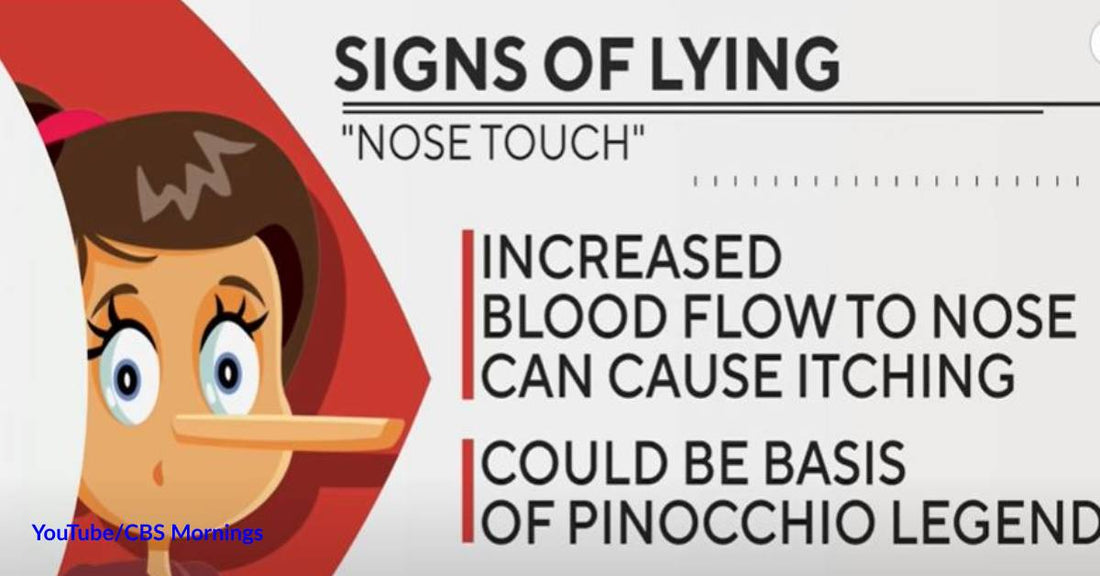Are There Really Tell-Tale Signs of a Liar? Here Are the Hard Truths from Experts
Doris de Luna
“There is no Pinocchio effect. People have long thought and taught erroneously that if somebody touches their mouth, for example, or covers their nose, or looks in a certain direction with their eyes, that these are behaviors indicative of deception. But there is ample research to show that there is no single behavior indicative of deception,” Joe Navarro, a former interrogator with the FBI who was involved in counter-intelligence and counter-terrorism, told National Geographic (UK).
How do you know if someone's lying? That's long been among mankind's quests. It's important for maintaining a just society, prosecuting criminals, purging heretics on the part of religious institutions, growing businesses, and of course, protecting our personal lives.
 Photo: YouTube/CBS Mornings
Photo: YouTube/CBS MorningsSurely, the behavior of an innocent person is different from someone guilty. Unfortunately, no. When under interrogation, both innocent and guilty parties display nervousness.
“We need to stop associating behaviors indicative of psychological discomfort with deception and acknowledge them purely for what they are: signs of stress, anxiety, apprehension, despair, suspicion, tension, concern, nervousness, etc. But not deception,” added Navarro.
If not through non-verbal signs, could there be verbal signs? Possibly. According to Dr. Abbie Maroño, a British university lecturer in psychology with a PHD in behavioral analysis who also works as director of education at Social-Engineer, LLC, there could be verbal signs to tell when a person is lying, such as factual inconsistencies.
 Photo: YouTube/CBS Mornings
Photo: YouTube/CBS MorningsMaroño explained that liars tend to adopt "self-handicapping techniques" in fear of getting caught. They often say "I forgot" and other similar phrases to avoid giving inconsistent statements. On the other hand, innocent parties tend to give a lot of details when telling their side of the story.
How about polygraphs? Are they effective? Today, a polygraph uses three measurements to determine if a person is lying: blood pressure, breathing pattern, and galvanic skin response. Nevertheless, polygraph results are not admissible in many courts of law around the world, with the American Psychological Association stating that "Most psychologists agree that there is little evidence that polygraph tests can accurately detect lies."
So, is there hope to tell when someone is lying?
 Photo: YouTube/CBS Mornings
Photo: YouTube/CBS MorningsAs Aldert Vrij, a psychology professor at the U.K.'s University of Portsmouth, wrote in his book, Detecting Lies and Deceit: Pitfalls and Opportunities, “Research has indicated that even professional lie catchers, such as customs officers and police officers, often make incorrect decisions, and that their ability to separate truths from lies typically does not exceed that of laypersons. One [reason] why even motivated people fail to catch liars is because lie detection is difficult. Perhaps the main difficulty is that not a single non-verbal, verbal, or physiological response is uniquely associated with deception. In other words, the equivalent of Pinocchio’s growing nose does not exist.”
Well, even if humanity fails to come up with a perfect strategy for distinguishing lies and truths, one thing is certain: There's Someone who reads hearts and from whom nothing can be hidden.
https://www.youtube.com/watch?v=y8lCYEoVmm4


